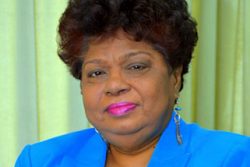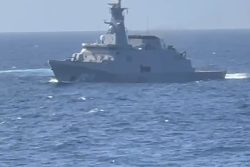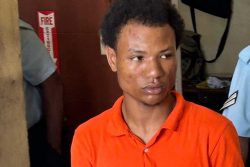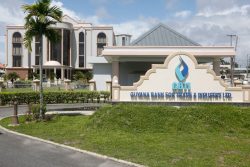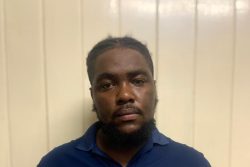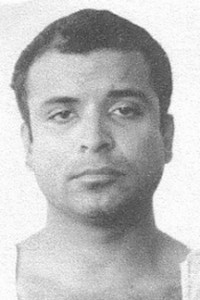 Guyanese drug accused Roger Khan’s criminal history and his alleged participation in a large scale criminal enterprise were among points a US judge considered in ruling in favour of an anonymous jury and a US government source has said that the infamous phantom squad murdered over 200 persons here.
Guyanese drug accused Roger Khan’s criminal history and his alleged participation in a large scale criminal enterprise were among points a US judge considered in ruling in favour of an anonymous jury and a US government source has said that the infamous phantom squad murdered over 200 persons here.
Judge Dora Irizarry issued the order on Tuesday. This means that the names, addresses and workplaces of members of the jury would not be revealed and that they would eat lunch together and be accompanied to and from the courthouse each day by the United States Marshals Service.
Justice Irizarry is of the opinion that the dangerousness of the defendant, as is alleged by the prosecution, is a fact worth considering since according to one of the government’s confidential sources the “Phantom Squad” Khan was associated with is responsible for “at least 200 extra-judicial killings from 2002 to 2006” in Guyana.
And while he is not charged with crimes considered to be violent in nature, his involvement with and leadership of a criminal organisation indicates his “propensity for violence.”
Khan through his lawyers had opposed the government’s motion and had argued that an anonymous jury was unnecessary as the government failed to establish that jurors needed protection and that such measures, in particular the partial sequestering of jurors, would have an unduly prejudicial effect on him.
However, the judge found that the empanelling of an anonymous and partially sequestered jury was necessary to protect the interest of the public and the jurors.
According to court documents seen by this newspaper in support of its argument for the sequestering of the jury, the prosecution had contended that an anonymous and partially sequestered jury was necessary to ensure the public’s interest in an impartial verdict and to protect prospective jurors.
The judge, in making her ruling, pointed out that there was evidence of Khan’s willingness to tamper with the judicial process since he admitted that in 1993 he successfully evaded federal prosecution in Vermont for possession of a firearm by a convicted felon by absconding to Guyana while on bail. That action, the judge said, indicated his ability to tamper with the judicial process in the US.
The judge added that the government’s confidential sources had indicated that Khan would not hesitate to order the killing of anyone he believed was aiding the US government in investigating and prosecuting him and his alleged criminal organisation. US government sources further alleged that Khan ordered the murder of one of his alleged narcotics associates, whom he believed was cooperating with the government. Justice Irizarry also pointed out that the court had to issue an order prohibiting Khan’s lawyers from making statements to the press to protect cooperating witnesses.
Khan had contended that the government could not rely on conduct occurring outside of the US, but the judge found this to be misplaced since the relevant inquiry was the willingness to tamper and not the location of the tampering.
Inaccurate news sources
Justice Irizarry also found that Khan’s contention that the government relied improperly on inaccurate Guyanese news sources lacked merit and held that the prosecution relied on more than just news articles in support of its allegations of the defendant’s dangerousness. She stated that the potential for juror intimidation by the anticipated media coverage of the trial supported empanelling an anonymous and partially sequestered jury.
Khan had admitted that his case “generated a substantial amount of publicity in Guyana” and this continued up to this day, the judge noted, giving the example of the government’s April 24 letter, which appeared the very next day on the front page of the Stabroek News.
“In fact, the Guyanese press reports on most developments as they occur in this case,” Justice Irizarry said.
She added that based on the nature of the coverage to date, the court found that there was a substantial likelihood that the names, addresses, and workplaces of the jurors would be reported immediately.
She said Khan’s contention that the jurors were not affected by media sources disseminating news outside the district lacked merit. “Consistent media coverage, even if minimal, provides support for anonymity as coverage enhances the ‘possibility that jurors’ names would become public and thus expose them to intimidation by defendants’ friends or enemies, or harassment by the public’,” the judge said.
She pointed out that any information published online in Guyana was available in the US and elsewhere.
Moreover, the concern is amplified by the fact that the (New York) district is home to the largest Guyanese population living outside Guyana and it would be unreasonable to assume that the case would not be followed by members of the Guyanese community.
Further, the judge said, local sources have covered the case as the New York Daily News has often sat in on status conferences. However, Justice Irizarry said, the court was mindful of its duty to protect Khan’s constitutional rights and in order to preserve the presumption of innocence would provide prospective jurors with a neutral explanation of the reason for their anonymity and partial sequestration.
Khan is charged with an eighteen-count indictment of distribution, importation, and possession of cocaine and engaging as a principal administrator, organiser, and leader of a continuing criminal enterprise in New York and elsewhere.
He is accused of heading a powerful, violent, cocaine trafficking organisation out of Guyana. He faces a maximum penalty of life in prison if convicted.

